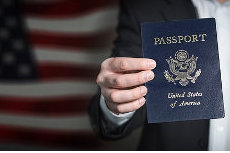 Up until now, Americans have been able to freely fly from state to state using only their state issued IDs, such as a driver’s license. However, new regulations administered by the Transportation Security Administration (TSA) will change this for certain states, requiring citizens to carry a passport, or similar documentation, when flying domestically. Nine states will be facing such restrictions come January 21, 2018 and even more are up for review. Since less than half of the population are estimated to have up-to-date passports; this can make travel a bit more complicated for people who regularly fly within the country.
Up until now, Americans have been able to freely fly from state to state using only their state issued IDs, such as a driver’s license. However, new regulations administered by the Transportation Security Administration (TSA) will change this for certain states, requiring citizens to carry a passport, or similar documentation, when flying domestically. Nine states will be facing such restrictions come January 21, 2018 and even more are up for review. Since less than half of the population are estimated to have up-to-date passports; this can make travel a bit more complicated for people who regularly fly within the country.
Which States Will Require a Passport?
The new legislation is a result of the REAL ID Act from 2005, which created federal security standards for IDs and driver’s licenses issued by the states. The goal of the law is to standardize certain verification tools to determine each ID holder’s identity, implement anti-counterfeit technology and assure background checks for those applying for the ID. These measures are to be put in place to boost security for air travel within the United States, and accordingly if certain state IDS don’t measure up to the new standards, then they cannot be accepted when boarding airplanes.
The TSA has announced that state IDs from Kentucky, Maine, Minnesota, Missouri, Montana, Oklahoma, Pennsylvania, South Carolina, and Washington do not meet the federal standards, and their citizens will need alternative IDs to be able to board an airplane or enter any US military base. The list won’t end here as more states, including New York, California, Massachusetts and Oregon are currently under review by the TSA.

Further Developments
By October 1, 2020, all US citizens will need to present an ID that is up to the REAL ID Act’s standards. As of right now, only 24 states and Washington, DC issue IDs that comply with the legislation so far more states are likely to join the list requiring different forms of ID. While US passports are the most obvious choice, other acceptable forms of ID include a US military ID, a Permanent Resident Card and DHS trusted traveler cards. Some states, such as Kentucky, are planning on issuing an optional travel ID for an additional fee which will meet the travel requirements.
| What You Need to Know |
| There are only about three months before the legislation will be enacted, so it’s a good idea to prepare for these changes sooner rather than later, especially if you’re from one of the aforementioned states. Here are some highlights that you need to know about the coming changes. ➠ If a state is still listed as under review by the TSA, citizens can still use their state-issued IDs for domestic flights. Only those listed as noncompliant will need alternative identification. |
Alternatives to Flying
For people who need to plan last-minute trips or simply do not have the time or money to apply for a passport, there are plenty of other options to travel throughout the country. Extensive train services, and long-distance buses like Greyhound and megabus offer routes to cities throughout the United States. Popular Routes include:
 New York, NY – Washington, DC with meagabus US, starting from $0.86
New York, NY – Washington, DC with meagabus US, starting from $0.86
 Los Angeles, CA – Phoenix, AZ with Greyhound, starting from $18.61
Los Angeles, CA – Phoenix, AZ with Greyhound, starting from $18.61
 Portland, OR – Seattle, WA with Greyhound, starting from $11.05
Portland, OR – Seattle, WA with Greyhound, starting from $11.05
 Chicago, IL – Detroit, MI with megabus US, starting from $8.46
Chicago, IL – Detroit, MI with megabus US, starting from $8.46
 Houston, TX – New Orleans, LA with megabus US, starting from $0.85
Houston, TX – New Orleans, LA with megabus US, starting from $0.85


